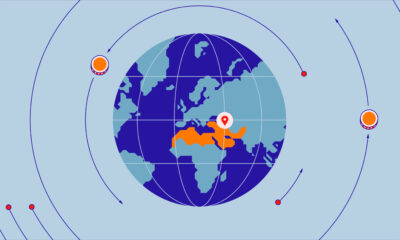News
MENA Digital Economy Set To Hit $400 Billion By 2030
Education and health technology sectors alone are forecast to reach a combined market size of $20 billion by 2030.

Although COVID-19 sent shockwaves through brick-and-mortar retail businesses and decimated the travel industry, the world’s digital economy actually reaped enormous benefits from lockdowns and reduced movement.
According to newly released data, the digital economies of the Middle East and North Africa (MENA) countries are now estimated to be worth an incredible $400 billion by 2030.
To reach the enormous milestone in under ten years, the entire region’s economy will need to undergo rapid transformation. Sectors including food, travel and bill payment have declined in recent years. However, health and education technology appear to be booming — though predictably, online retail is driving much of the growth, increasing at a rate of 20% per year alone.
According to the report, Generation Z will fuel a great deal of the decade’s growth, and the expansion of EdTech services will require significant skill development, with schools and higher education institutions adding new technology-focused courses to their curriculums.
Also Read: Saudi Arabia To Send First Female Astronaut Into Space By 2023
Saudi Arabia and the United Arab Emirates have already significantly contributed to the region’s global digital expansion. Future growth is anticipated to be more evenly spread among the MENA countries, as the two leading nations currently account for half of the area’s total digital economy.
According to the new survey, the rest of the MENA region is improving in its rate of digital adoption, with the time spent on digital channels now nearing 8 hours per day, which is a figure similar to the United Arab Emirates and Saudi Arabia.
News
Alienware Just Announced Six New Gaming Monitors
The new models include three QD-OLED and three budget-friendly QHD options, expanding the company’s lineup for all gamers.

Alienware has just updated its gaming monitor lineup with six new additions, including the highly anticipated Alienware 27 4K QD-OLED Monitor. The latest wave of releases is set to reach more gamers than ever, offering high-end QD-OLED displays alongside more budget-friendly options.
The latest displays clearly show that the company is doubling down on QD-OLED with three new models sporting the technology. A redesigned Alienware 34 Ultra-Wide QD-OLED Monitor is also making a return, further refining what is already a fan-favorite display.
A Unified Design: The AW30 Aesthetic
All six monitors feature Alienware’s new AW30 design language, first introduced at CES. The AW30 aesthetic brings a futuristic, minimalist look that unites the entire lineup under a cohesive visual identity.
Pushing QD-OLED Even Further
The refreshed Alienware 34 Ultra-Wide QD-OLED Monitor (AW3425DW) builds on its predecessor’s success with a 240Hz refresh rate (up from 175Hz) and HDMI 2.1 FRL support. It also gains G-SYNC Compatible certification alongside AMD FreeSync Premium Pro and VESA AdaptiveSync, ensuring ultra-smooth performance. With a WQHD (3440×1440) resolution and an 1800R curve, this display enhances immersion for both gaming and cinematic experiences.
For those who crave speed, the Alienware 27 280Hz QD-OLED Monitor (AW2725D) pairs a high refresh rate with QHD resolution, balancing sharp visuals with ultra-smooth gameplay. Meanwhile, the Alienware 27 4K QD-OLED Monitor (AW2725Q) delivers stunning clarity with an industry-leading pixel density of 166 PPI, making it the sharpest OLED or QD-OLED monitor available.
Also Read: Infinite Reality Acquires Napster In $207 Million Deal
Worried about OLED burn-in? Alienware’s entire QD-OLED lineup comes with a three-year limited warranty covering burn-in concerns, offering peace of mind for gamers investing in these high-end displays.
Bringing QHD To A Wider Audience
Alongside QD-OLED, Alienware is also releasing three new QHD gaming monitors aimed at more price-conscious gamers. The Alienware 34 Gaming Monitor (AW3425DWM), Alienware 32 Gaming Monitor (AW3225DM), and Alienware 27 Gaming Monitor (AW2725DM) provide a range of sizes and formats to suit different preferences:
- The Alienware 34 Gaming Monitor (AW3425DWM): An ultrawide (WQHD) option for a panoramic, immersive experience.
- The Alienware 32 Gaming Monitor (AW3225DM): A standard 16:9 panel for a traditional but expansive desktop setup.
- The Alienware 27 Gaming Monitor (AW2725DM): A 27” display offering the same performance in a more compact form factor.
All three gaming monitors feature a fast 180 Hz refresh rate, a 1ms gray-to-gray response time, and support for NVIDIA G-SYNC, AMD FreeSync, and VESA AdaptiveSync to eliminate screen tearing. Additionally, with 95% DCI-P3 color coverage and VESA DisplayHDR400 certification, these displays deliver vibrant colors and high dynamic range for lifelike visuals.



























